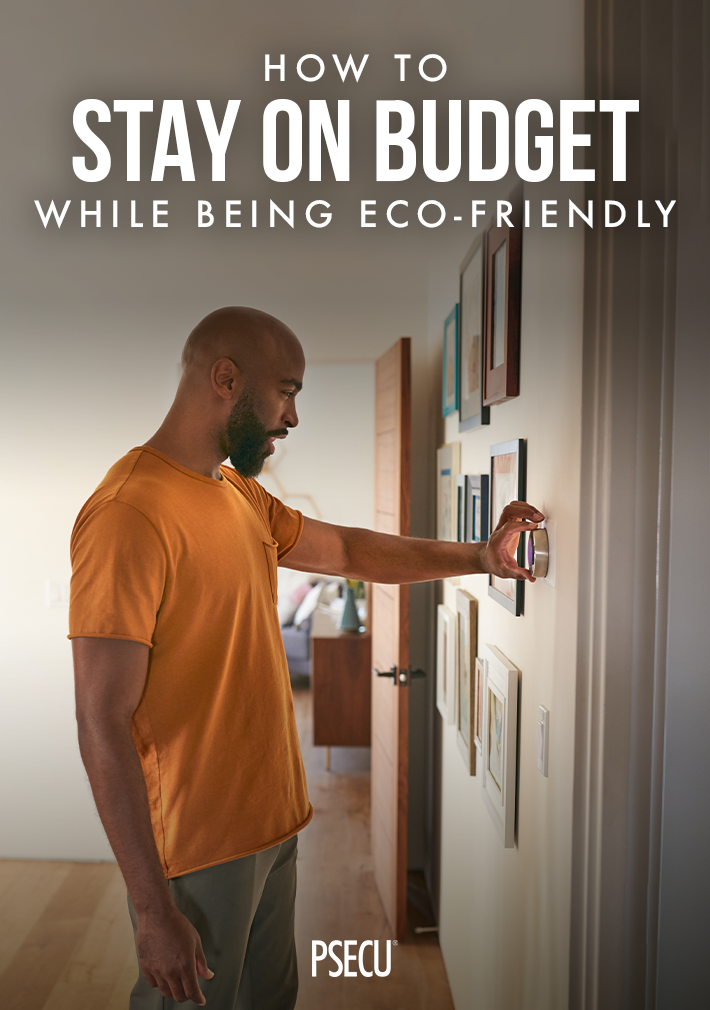Sure, you recycle, and you skip the disposable straw when you eat out. But have you made an environmentally sound budget? If you have yet to go green with your approach to money management, try implementing these tips for a more sustainable action plan.
1. Make Your Daily Routine More Energy Efficient
You can save money by making small changes to your everyday routine that also benefit the environment.
- Adjust your thermostat: Set your temperature a few degrees lower in the winter and a few degrees higher in the summer. Your heating and air conditioning costs will fall, and you’ll use less energy each day.
- Take advantage of natural sunlight: In the winter, there’s nothing more comforting than walking into a room filled with natural light. Open your curtains and shades to let the sunshine in all day long. The light will warm the room and reduce your energy consumption.
- Cook outside in the summer: There’s a reason why so many people grill outside during the summer. Using the stove or oven indoors raises the temperature in your kitchen, requiring more energy to cool off the area after you finish cooking. By preparing your meals outside, you keep the extra heat outdoors and maintain your home’s internal temperature.
- Seal any air leaks: Leaks can let hot air inside during the summer and cold air inside during the winter, making temperature regulation more difficult. Examine each window in your home for drafts. If you feel air coming in, use caulking to seal off the opening.
- Swap out your light bulbs: Light-emitting diode (LED) bulbs are more efficient than traditional incandescent bulbs. When you use an LED bulb, you get brighter light, a much longer bulb life, and overall reduced energy costs.
- Replace your air filters: If your air conditioning unit seems to be working overtime, the air filter could be dirty. Filters catch all the debris around your house, including pet hair, and disposable filters only last a few months. Replace or clean them regularly, even if they don’t look dirty, to put less strain on the air conditioning unit.
- Turn off the lights: Lights are energy vampires, sucking up resources when you’re out of the room. Get in the habit of turning off the light every time you’re leaving a space. Encourage your family members to do the same to decrease your family’s energy consumption.
- Air dry your dishes: Switch off the automatic dry feature on your dishwasher and let the cycle end early, then air-dry the dishes.
- Charge devices during the day: Passive energy consumption is a terrible drain on resources. Reduce unnecessary energy use by changing how you charge your phone and other devices. Instead of plugging them in overnight, charge them during the daytime for only the amount of time needed to reach full battery.

2. Cook at Home and Reduce Food Waste
How many times have you bought a big load of produce at the grocery store, pledging to eat a salad each night, only to trash half the food you purchased two weeks later? While it’s admirable to have goals for healthy eating, it’s more realistic to plan for what you’ll actually eat.
If you rarely make salads, for example, don’t buy a huge bag of lettuce and carrots. If you don’t like smoothies, skip the kale and yogurt.
Next, make a meal plan. Decide what to eat for dinner every night of the week. When you have a schedule, you’re less likely to feel overwhelmed by food choices after work when all you want to do is relax.
A meal plan can also help you use your food more efficiently and reduce waste. It can help you repurpose leftovers into a whole new meal.
- If you have spaghetti one night, you might have leftover spaghetti sauce. Plan for homemade pizza the following night, which offers an opportunity to incorporate the unused sauce.
- Bake chicken for dinner one night, then turn the leftovers into chicken soup you make in the crockpot the next morning.
- Brown double the amount of ground beef or turkey you need for tacos. Then use the second batch the next night to make chili.
3. Buy Items Second-Hand
Who says everything you buy has to be new? You can find great deals on gently used products such as clothing, appliances, furniture, and books.
Try searching online marketplaces for bargains. A bike you buy from one of these sites may cost half of what you pay in the store, but the benefit to the environment is even better. When you purchase used items, you produce less waste and reuse things that have already been made.
If you have children, buying second-hand items is practical, too. Kids grow so fast that they often only wear clothes and shoes a few times before the items become too small. You’ll feel less frustrated about getting rid of “new” clothes if they aren’t actually new.
Careful planning can help you save money and the planet. For other financial resources, check out our WalletWorks page.
The content provided in this publication is for informational purposes only. Nothing stated is to be construed as financial or legal advice. Some products not offered by PSECU. PSECU does not endorse any third parties, including, but not limited to, referenced individuals, companies, organizations, products, blogs, or websites. PSECU does not warrant any advice provided by third parties. PSECU does not guarantee the accuracy or completeness of the information provided by third parties. PSECU recommends that you seek the advice of a qualified financial, tax, legal, or other professional if you have questions.
